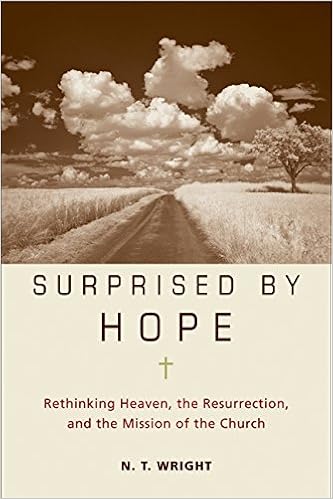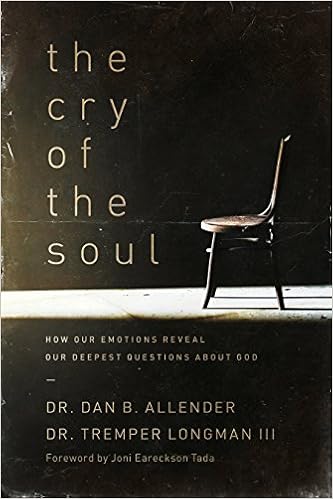I just finished NT Wright's book, Surprised by Hope. His final paragraph is worth reproducing here.
In our incomplete world God's gentle offer and demand press upon us as fearful things, almost threatening. God in his gentle love longs to set us free from the prison we have stumbled into--the loveless prison where we refuse both the offer and the demand of forgiveness. We are like a frightened bird before him, shrinking away lest this demand crush us completely. But when we eventually yield--when he corners us and finally takes us in his hand--we find to our astonishment that he is infinitely gentle and that his only aim is to release us from our prison, to set us free to be the people he made us to be. But when we fly out into the sunshine, how can we not then offer the same gentle gift of freedom, of forgiveness, to those around us? That is the truth of the resurrection, turned into prayer, turned into forgiveness and remission of debts, turned into love. It is constantly surprising, constantly full of hope, constantly coming back to us from God's future to shape us into the people through whom God can carry out the work in the world.--NT Wright, Surprised by Hope, page 289.
This also calls to mind a verse upon which I have been meditating today: "As a prisoner of the Lord, I urge you: Live a life that is worthy of the calling He has graciously extended to you. Be humble. Be gentle. Be patient. Tolerate one another in an atmosphere thick with love.-Ephesians 4:1-2 (The Voice)
29 February 2016
17 February 2016
Book Review: Cry of the Soul
Talk of emotion often makes Christians squirm. We may give a nod to emotions, primarily to acknowledge our need to keep them under control. Whether stated or not, too many Christians operate from the assumption that a godly person is one who suppresses negative emotions. Positive emotions are accepted, but only if they are not too extreme. In other words, for many, the Christian is to be a thinker, not a feeler. But the Bible is a book filled with emotion.
In their excellent book The Cry of the Soul: How Our Emotions Reveal Our Deepest Questions About God (1994), Dan Allender and Tremper Longman III have invited the readers to explore the language of emotion, in our own lives and through the words of Scripture, particularly in the Psalms. They encourage us to look into our shame, and fear, and sadness and ask what those emotions tell us about who God is.
Cry of the Soul is an excellent book. If you wish to develop a deeper understanding of your emotional life and of your relationship with God, this is a great place to begin.
In their excellent book The Cry of the Soul: How Our Emotions Reveal Our Deepest Questions About God (1994), Dan Allender and Tremper Longman III have invited the readers to explore the language of emotion, in our own lives and through the words of Scripture, particularly in the Psalms. They encourage us to look into our shame, and fear, and sadness and ask what those emotions tell us about who God is.
Cry of the Soul is an excellent book. If you wish to develop a deeper understanding of your emotional life and of your relationship with God, this is a great place to begin.
04 February 2016
Relational sin in women
I'm in the process of reading through Larry Crabb's excellent book Fully Alive: A Biblical Vision of Gender that Frees Men and Women to Live Beyond Stereotypes. This book is striking me much more deeply this time around than the last.
Beginning on page 133, there is section entitled "Relational Sin in Women." I was struck by the apparent truth of these few paragraphs (from my perspective as a man).
Feminine words from one woman draw another woman into noncompetitive rest that overcomes the second woman's need to display or protect herself. And a woman's feminine words arouse a man, not to use her for his own pleasure, but to move toward her as a woman of value and worth. He sees her and wants to know her.
But unfeminine words, words that are energized by a demand to be seen and known, create either relational distance or counterfeit intimacy (my underline). When one woman relates to another woman in the energy of control or defense, their two souls never connect. Competition, jealousy, snubs, and threats create distance. Some kindhearted woman might respond to the pull of a needy female friend and provide affirmation that creates the illusion of closeness, but in fact she only deepens fragile dependency.
Men respond to unfeminine words with irritable stiffness ("Will you stop trying to control me?"), stubborn retreat ("I don't want to talk about it!"), defensive challenge ("You might want to try accepting me once in a while."), or selfish exploitation ("C'mon, let's go to bed.").
It comes down to this: a woman's words will draw others to her or distance others from her. She will speak either with the feminine power of an openness that invites the best from another and embraces when it comes or with unfeminine power designed to protect herself from another through control that drives her from people.
I would like more men and women to read this book to understand the gendered nature of relational sin.
Beginning on page 133, there is section entitled "Relational Sin in Women." I was struck by the apparent truth of these few paragraphs (from my perspective as a man).
Feminine words from one woman draw another woman into noncompetitive rest that overcomes the second woman's need to display or protect herself. And a woman's feminine words arouse a man, not to use her for his own pleasure, but to move toward her as a woman of value and worth. He sees her and wants to know her.
But unfeminine words, words that are energized by a demand to be seen and known, create either relational distance or counterfeit intimacy (my underline). When one woman relates to another woman in the energy of control or defense, their two souls never connect. Competition, jealousy, snubs, and threats create distance. Some kindhearted woman might respond to the pull of a needy female friend and provide affirmation that creates the illusion of closeness, but in fact she only deepens fragile dependency.
Men respond to unfeminine words with irritable stiffness ("Will you stop trying to control me?"), stubborn retreat ("I don't want to talk about it!"), defensive challenge ("You might want to try accepting me once in a while."), or selfish exploitation ("C'mon, let's go to bed.").
It comes down to this: a woman's words will draw others to her or distance others from her. She will speak either with the feminine power of an openness that invites the best from another and embraces when it comes or with unfeminine power designed to protect herself from another through control that drives her from people.
I would like more men and women to read this book to understand the gendered nature of relational sin.
Subscribe to:
Posts (Atom)


